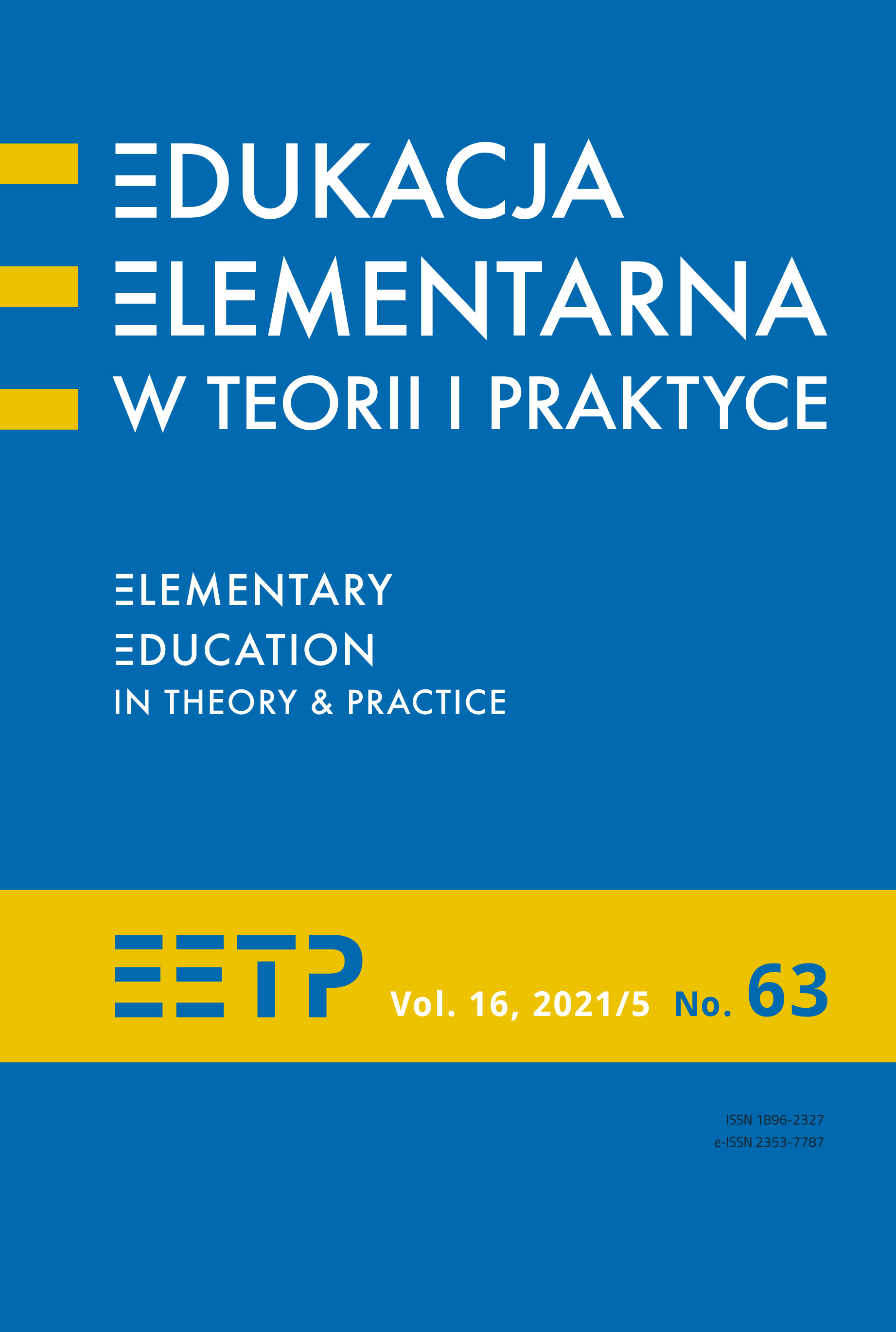Computer Games in STEAM Education – Possibilities and Obstacles
Abstract
The increasing share of various elements from games in education is becoming a fact. Through the algorithmization of activities, changes in the process of presenting phenomena or their simulation in the course of education, computer games become its attractive aspect, especially in STEAM education. The development and availability of the technology that surrounds us result in the conclusion that special actions should be taken with reference to its increasingly younger users in order to familiarize them with it and encourage them to interact with it to create new solutions for their needs. Due to their commonness in everyday life of students, games in the service of education are becoming an obvious solution for providing knowledge and skills necessary for the performance of various professions in future. Because of the dynamically developing gaming market, the availability of computer games for this purpose is no longer limited to those marked as educational. The games that students choose for entertainment purposes also contribute to a greater interest in the STEAM area. The aim of the article is to indicate selected possibilities of using computer games in STEAM education, and potential obstacles that may occur at various stages of the suggested activities. The discussed issues are accompanied by recommendations of actions that may lead to the improvement of the educational process and help teachers, parents and creators in selecting the form and content of games more effectively.
References
Becker K. (2021). What’s the difference between gamification, serious games, educational games and game-based learning? „Academia Letters”, Article 209. DOI: 10.20935/AL209
Bielecki M. (2015). Przyjemne z pożytecznym? Badania nad wpływem gier komputerowych na procesy poznawcze. Wszechświat, 1–3 (116), s. 26–30.
Dębski M., Bigaj M. (red.). (2020). Granie na ekranie. Młodzież w świecie gier cyfrowych, Gdańsk: Gdańskie Wydawnictwo Psychologiczne
Gajderowicz T., Jakubowski M. (2020). Cyfrowe wyzwania stojące przed polską edukacją, Warszawa: Polski Instytut Ekonomiczny.
Gaming Skills Translator https://go.manpowergroup.com/game2work [dostęp 02.11.2021].
Hopkins I., Roberts D. (2015). “Chocolate-covered Broccoli”? Games and the Teaching of Literature. „Changing English”, 22(2), s. 222–236. DOI:10.1080/1358684x.2015.1022508
IV Edycja GameInn https://www.gov.pl/web/ncbr/rekordowa-liczba-wnioskow-w-gameinn [dostęp 02.11.2021].
Krakowski Park Technologiczny (2020). Raport Kondycja Polskiej Branży Gier https://www.kpt.krakow.pl/wp-content/uploads/2020/12/kpbg2020.pdf [dostęp: 20.09.2021].
Łojszczyk A., Surdyk A. (2019). Agresywne światy – agresja i samoocena a style gry graczy MMORPG. Homo Ludens, (1 (12), s. 109-133.
Newzoo (2021). Global Games Market Report 2021, https://newzoo.com/insights/trend-reports/newzoo-global-games-market-report-2021-free-version/ [dostęp: 02.11.2021].
Piotrowska-Madej K., Lewandowski P., Madej Ł. (2021). AR i VR w edukacji i terapii dziecka z niepełnosprawnością intelektualną. „Annales Universitatis Paedagogicae Cracoviensis Studia Paedagogica”, 12, 110–125. DOI 10.24917/22992103.12.9
Plebańska M., (2018). STEAM – edukacja przyszłości, Teorie i badania, Mazowiecki Kwartalnik Edukacyjny Meritum, 4 (51), s. 2-7.
Popławska A., Aniskievich T. (2017). Wyzwania cyberprzestrzeni a wybrane kompetencje nauczycieli i uczniów, „Rocznik Lubuski”, t. 43, cz. 1, s. 245–258.
Postman N. (2004). Technopol. Triumf techniki nad kulturą, tłum. Anna Tanalska-Dulęba, Warszawa: MUZA.
Słomczyński, M. (2014). Dydaktyczne aspekty projektowania gier. „Homo Ludens”, 6(1), 141–152. http://old.ptbg.org.pl/dl/163/Maciej%20S%C5%81OMCZY%C5%83SKI%20-%20Dydaktyczne%20aspekty%20projektowania%20gier.pdf [dostęp 02.11.2021].
Szpunar M. (2006), Technofobia versus technofilia - technologia i jej miejsce we współczesnym świecie, [w:] Królikowska J. (red.), Problemy społeczne w grze politycznej, Warszawa: Wydawnictwo Uniwersytetu Warszawskiego, s. 370-384
Wronka S. (2018), Nowoczesne technologie w nauczaniu przedmiotów ścisłych, [w:] Kompetencje przyszłości, red. S.M. Kwiatkowski, Warszawa: Fundacja Rozwoju Systemu Edukacji, Seria Naukowa, t. 3, s. 335–347.
Wuszt K. (2013). Kształcenie dorosłych użytkowników technologii informacyjnych, [w:] Andrzejewicz A., Bednarek J., Ćmiel S. (red.), Człowiek w świecie Rzeczywistym i wirtualnym. Nowy wymiar zagrożeń w świecie realnym i wirtualnym, Józefów: Wydawnictwo WSGE, s. 137.
Copyright (c) 2021 Elementary Education in Theory and Practice

This work is licensed under a Creative Commons Attribution-NoDerivatives 4.0 International License.
- When submitting a text, the author declares that he/she is the Author of the article (hereinafter referred to as the “Work”) and:
- he/she owns the exclusive and unlimited copyright to the Work,
- is entitled to dispose of the copyright to the Work.
Declares that it does not infringe any third party copyrights or legal rights.
Declares that there is no conflict of interest.
2. At the same time, the Author grants the Ignatianum University in Cracowa royalty-free, non-exclusive and territorially unlimited licence to use the Work in the following fields of exploitation:
- recording the Work in a hard copy, as well as on a digital or magnetic medium;
- reproduction of the Work using any technique, without limitation of the number of editions or copies;
- distribution of the Work and its copies on any medium, including marketing, sale, lending, and rental;
- introduction of the Work into a computer memory;
- disseminating the Work in information networks, including in the Internet;
- public performance, exhibition, display, reproduction, broadcasting and re-broadcasting, as well as making the Work available to the public in such a way that everyone can have access to it at a time and place of their own choosing;
- within the scope of dependent rights to the Work, including in particular the right to make necessary changes to the Work resulting from editorial and methodical development, as well as to translate the Work into foreign languages;
The licence is granted from the moment of the transfer of the Work to the Ignatianum University in Cracow. The Ignatianum University in Cracow is entitled to grant further sub-licences to the Work within the scope of the right granted. The licence is time-limited and it is granted for a period of 15 years, starting from the date of its granting.
Authors are permitted and encouraged to publish their text online (e.g. in their institution’s repository or on the institution’s website) before or during the submission process as this may lead to beneficial exchanges, as well as earlier and greater citation of the published text (See The Effect of Open Access). We recommend using any of the following portals of research associations:
- ResearchGate
- SSRN
- Academia.edu
- Selected Works
- Academic Search




